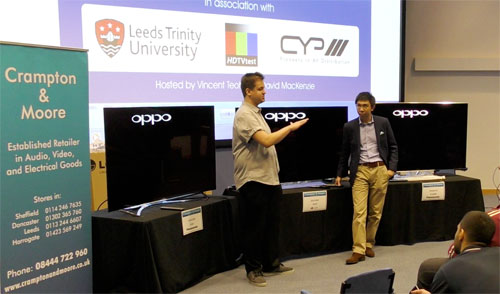A side-by-side TV shootout event held last weekend through a collaboration between HDTVTest, independent British AV retailer Crampton & Moore and Leeds Trinity University has delivered a clear verdict: the latest 4K OLED TVs from LG and Panasonic has finally laid to rest the legacy of plasma.

With special consideration given to separate the pair of Panasonic televisions (to minimise the chance of one remote keypress affecting both TVs), the three displays being compared were arranged in this order from left to right:
All three TVs were calibrated to D65 greyscale, BT.1886 gamma, Rec.709 colour space, and peak white luminance of 120 cd/m2 (windowed patterns). Calibration equipment used were Klein K10-A colorimeters, JETI Specbos 1211 reference-grade spectroradiometer, DVDO AVLab TPG signal generator, and CalMAN Ultimate calibration software. Source devices included an OPPO Blu-ray player and a Panasonic Freeview recorder whose video output was piped through HDMI splitters and cables kindly loaned by connectivity solution provider CYP Europe to the televisions.
The following test patterns/ Blu-ray demo sequences were used to help attendees make up their mind:
Out of 35 attendees, 28 stayed until the end to vote for the best display (regardless of price) after watching the aforementioned material to judge various aspects of picture quality. Attendees with known affiliations with TV manufacturers were excluded from the voting process. Here’s a breakdown of the votes:
That the 4K OLEDs received a significant majority of the votes came as no surprise: they were capable of deeper blacks (each pixel can be individually switched off to produce true blacks due to OLED technology’s self-emissive properties) and brighter whites (owing to less aggressive ABL circuitry) than the plasma, although many attendees felt that the Panasonic ZT comfortably held its own 90% of the time. In fact, the Panasonic PDP exhibited better screen uniformity (particularly near-black) and higher motion clarity than the pair of OLED TVs.
Perhaps more surprising was how close the LG EF9500 ran the Panasonic CZ950, especially considering that the former can be bought for less than half the price of the latter at this time of writing. The Panasonic OLED exhibited less vignetting and vertical banding in dark scenes than the LG, but suffered from a faint vertical yellow band on the right side on a full-white screen, which thankfully was mostly unnoticeable in real-life content.
Outright colour accuracy was also better on the Viera 65CZ952, though the LG 65EF950V’s colours could be calibrated (using a specific technique) to a reasonably accurate level that’s not too dissimilar to those displayed by the Panasonic CZ952 and ZT65. The Panasonic OLED delivered superior above-black handling versus the LG: while some attendees praised the 65EF950 for revealing more shadow detail than the TX-65CZ952B, we thought that the LG was actually displaying them too brightly (and occasionally floated blacks even after we’d checked and rechecked that we used the correct [Brightness] setting using a PLUGE pattern), and the Panasonic was more accurate to the source.
Sifting through the ballots, those who voted for the LG cited its flat-screen form factor and currently available HDR (high dynamic range) compatibility as key factors. Perhaps there’s a message in there for TV makers…
While Panasonic’s 4K OLED TV pipped LG’s to the crown, verbal and written feedback from attendees indicated that had value for money been taken into account, the LG 65EF9500 would have won in a landslide. It’s important to remember though that the Viera CZ950 is merely an aspirational, statement product for Panasonic to test the waters and finally banish the ghost of plasma, which the company has succeeded in achieving to a certain extent.
As good as plasma was (and still is), it will never fulfil the full potential of the forthcoming Ultra HD Blu-ray format due to lack of UHD (ultra high-definition) resolution and HDR playback. In the process of wrapping up this article, it suddenly occurred to us that this is probably the last time we’ll see plasma TV in a public shootout ever again. We’ll shed a nostalgic tear, but let’s look forward to more flat and affordable OLED TVs next year.
Note: If you’re interested in buying either the Panasonic TX-65CZ952B or LG EF950, please consider purchasing from Crampton & Moore Leeds (call 0113 244 6607 and ask for David) who went to great lengths to organise this event and secure the televisions for the shootout. A very big thank you to them – they deserve your continuing support so the next shootout can happen.